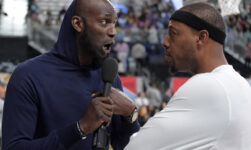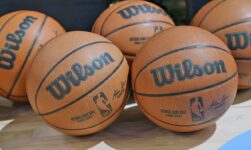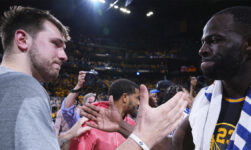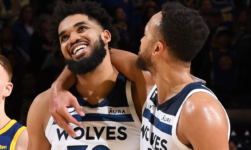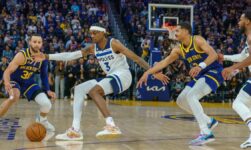Maxey cleared to shoot, run; Rivers feels Sixers ‘treading water’ originally appeared on NBC Sports Philadelphia
Tyrese Maxey was in his happy place Wednesday.
Though Maxey’s return from a left foot fracture he suffered on Nov. 19 is not imminent, he was present on the floor after the Sixers’ practice in Camden, New Jersey. He dribbled a ball and was a smiley spectator as Jaden Springer ran through competitive drills with Sixers coaches.
According to head coach Doc Rivers, Maxey was cleared to start shooting two days ago and allowed to run up and down the floor Wednesday. The 22-year-old has yet to progress to sprinting or jumping.
Thus far, it appears his rehab has gone as expected. Rivers called Maxey “a ways away” but didn’t offer a specific timeline.
“He’s been going nuts — stir-crazy is a better word,” Rivers said. “Calling us, FaceTiming us. ‘I don’t know what to do.’ Sit at home and watch TV; I don’t know what to tell you. But at least today, he was so happy because he was shooting. He hasn’t been able to touch a ball, which for him … he’s young. He probably has never done this.”
Rivers highlighted that Maxey is not the only Sixer dealing with an injury. In fact, he said he thought the team only had seven players available to practice, which led him to focus on film.
“Just bumps,” Rivers said. “And then Danuel House had something done with his foot. He’ll be fine. I can’t even think of (them all), but it was a lot of guys.”
Georges Niang’s injury sounded perhaps more significant than a typical “bump.” Rivers described Niang, who missed Monday’s double-overtime loss to the Rockets with right foot soreness, as “out.” He put up shots after practice but didn’t seem to place any serious stress on the foot.
P.J. Tucker played a season-high 42 minutes against the Rockets. He’s the one Sixer to have played in all of the team’s games. The 37-year-old once had a 267-game ironman streak with the Rockets.
Story continues
“Yeah, it’s what I do,” Tucker said with a chuckle. “I play. You go through regular-season injuries, little things here and there, but just keep fighting, keep building. I’m fine.”
James Harden’s right foot tendon strain is no longer among the Sixers’ health concerns. Rivers is glad to have Harden back but counting on the 33-year-old to perform at a higher level than in Houston, where he shot 4 for 19 from the floor, committed seven turnovers, and failed to seize several pivotal moments.
“Just keeping up our pace,” Rivers said. “Understanding how we’ve got to play. Executing down the stretch of games; that’s vital for us. And then defensively, just being in the right spots. … He looked great conditioning-wise. He didn’t play well. That’s almost expected at times when you miss that many games. So conditioning and timing.”
The Sixers’ losses can’t all be attributed to injuries. The Houston defeat was an especially poor game in light of the Sixers’ superior talent, the opportunity to snap a two-game losing streak, and the time to rest and recover on the horizon before a season-long seven-game homestand that begins Friday.
It was also the second consecutive contest in which the Sixers conceded heaps of costly offensive rebounds. Across the Sixers’ losses to the Grizzlies and Rockets, their opponents grabbed a whopping 41.6 percent of offensive boards, per Cleaning the Glass. (The 30th-ranked Nets have allowed opponents this season to rebound 31.2 percent of their misses.)
“We’ve got to be more physical,” Tucker said. “Period. We’ve kind of been saying that all year, but we’ve got to be more physical. We’ve got to hit first. We’ve got to be more aggressive on the box-outs and helping each other. It’s not really always the guy that’s actually boxing out — it’s the help, the guy behind him, and just being on the same page. But we’ve definitely got to be more physical. That’s the bottom line.”
Though Rivers was obviously not pleased with his team’s rebounding lately, he thought there were notable contributing factors besides insufficient physicality.
“Well, Steven Adams caused the Memphis one,” he said. “That one was simple. The Houston one, they just crashed from the slots and we just didn’t have a lot of block-outs. And again, I still think in both of those games — even Steven Adams — dribble penetration is what creates offensive rebounds, because the big is helping.
“And against Memphis, let’s say if Joel (Embiid) goes to help, Steven Adams is getting the rebound. There’s no other human on your team that can keep him off the glass. That’s why he’s so good. He’s a great offensive rebounder in general, but he also plays with (Ja) Morant, who lives in the paint. … The way you can keep him off the glass is by staying on his body. But if you do that, then Morant’s dunking all game. But then I thought Houston lived in the paint, as well.”
The 6-foot-2 Maxey won’t transform the Sixers into an above-average rebounding team or single-handedly fix the issues with getting on the “same page” that Tucker mentioned multiple times.
He’d likely boost the Sixers’ collective energy and optimism, though.
Asked about the team using its upcoming homestand to gain positive momentum, Rivers’ response was health-centric.
“It would be nice,” he said. “That’s what you want, but you need all your guys back, too. We’re treading water. We’re trying to get everybody right and healthy. Just because you’re at home … if you’re not all healthy, it’s still going to be hard.
“But I think we’re healthier for the first time in a while. I think James is going to keep getting better during this stretch. I think it’s great that we have these couple of days. Even though we didn’t do much today, James still gets to do some conditioning. I still got to work with guys.
“We’ll have a good practice tomorrow. We have a game, (then) we have days off. So yeah, I think this is a great stretch for us. If we were all intact, it would be one that you’d say, ‘Let’s win ‘em all.’ We’re still in that game-to-game phase until we get our guys back intact.”


